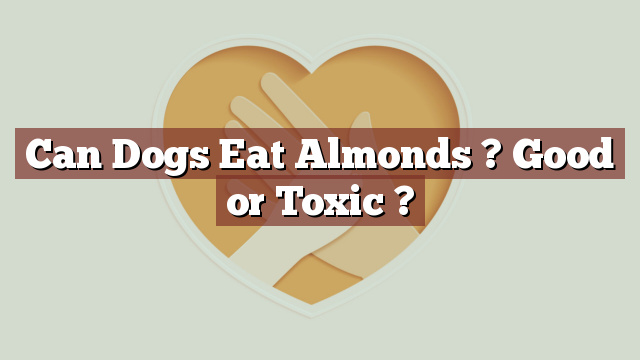Can Dogs Eat Almonds? Good or Toxic?
As pet owners, it is important for us to be aware of what foods are safe for our furry friends to consume. While some human foods can be shared with dogs, others can be harmful or even toxic. One such food that often sparks curiosity is almonds. In this article, we will explore whether dogs can eat almonds, and if so, the potential risks and benefits associated with feeding them to our canine companions.
Nutritional Value of Almonds: What Do They Contain?
Almonds are highly regarded for their nutritional value and are a popular snack among humans. They are packed with essential nutrients, including healthy fats, fiber, protein, vitamin E, magnesium, and calcium. These nutrients contribute to various health benefits for humans, such as improved heart health and digestion. However, it is crucial to understand that dogs have different dietary requirements and metabolic processes compared to humans.
Can Dogs Eat Almonds? Safety and Toxicity Explained
While almonds are not inherently toxic to dogs, it is generally recommended to avoid feeding them this particular nut. Almonds are difficult for dogs to digest due to their high fat content, which can potentially lead to gastrointestinal issues like diarrhea, vomiting, or pancreatitis. Moreover, the shape and hard texture of almonds can pose a choking hazard or cause obstructions in a dog’s digestive system.
Potential Risks and Benefits of Feeding Almonds to Dogs
Feeding almonds to dogs can present several risks. As mentioned earlier, the high fat content can lead to digestive problems, and the risk of choking or intestinal blockage should not be underestimated. Additionally, almonds can sometimes be salted or flavored with spices like garlic or onion, which are toxic to dogs. Therefore, it is crucial to check for any seasonings or additives before considering sharing almonds with your pet.
On the other hand, almonds do offer some potential health benefits to dogs when consumed in moderation. The vitamin E present in almonds can promote healthy skin and coat, and the protein content can help support muscle development. However, it is important to note that these benefits can be obtained from other, safer sources within a dog’s regular diet.
My Dog Ate Almonds, Now What? Steps to Take
If your dog has accidentally consumed a few almonds, it is essential to observe their behavior and monitor for any signs of distress. Mild gastrointestinal upset, such as temporary diarrhea or vomiting, may occur. In such cases, it is recommended to provide plenty of water and a bland diet to settle their stomach. However, if your dog exhibits severe symptoms like persistent vomiting, abdominal pain, or difficulty breathing, it is crucial to seek immediate veterinary attention.
Conclusion: Almonds – Proceed with Caution for Your Canine Companion
In conclusion, while almonds are not necessarily toxic to dogs, they should be given sparingly and with caution. The potential risks, including digestive issues, choking hazards, and the presence of harmful seasonings, outweigh the limited health benefits that almonds may offer to dogs. It is always best to consult with a veterinarian before introducing any new human food into your dog’s diet to ensure their safety and well-being. Remember, there are plenty of other dog-friendly treats and snacks available that can provide the necessary nutrients without the potential risks associated with almonds.
Thank you for investing your time in exploring [page_title] on Can-Eat.org. Our goal is to provide readers like you with thorough and reliable information about various dietary topics. Each article, including [page_title], stems from diligent research and a passion for understanding the nuances of our food choices. We believe that knowledge is a vital step towards making informed and healthy decisions. However, while "[page_title]" sheds light on its specific topic, it's crucial to remember that everyone's body reacts differently to foods and dietary changes. What might be beneficial for one person could have different effects on another. Before you consider integrating suggestions or insights from "[page_title]" into your diet, it's always wise to consult with a nutritionist or healthcare professional. Their specialized knowledge ensures that you're making choices best suited to your individual health needs. As you navigate [page_title], be mindful of potential allergies, intolerances, or unique dietary requirements you may have. No singular article can capture the vast diversity of human health, and individualized guidance is invaluable. The content provided in [page_title] serves as a general guide. It is not, by any means, a substitute for personalized medical or nutritional advice. Your health should always be the top priority, and professional guidance is the best path forward. In your journey towards a balanced and nutritious lifestyle, we hope that [page_title] serves as a helpful stepping stone. Remember, informed decisions lead to healthier outcomes. Thank you for trusting Can-Eat.org. Continue exploring, learning, and prioritizing your health. Cheers to a well-informed and healthier future!

